By: Izumi Hasegawa March 23, 2017
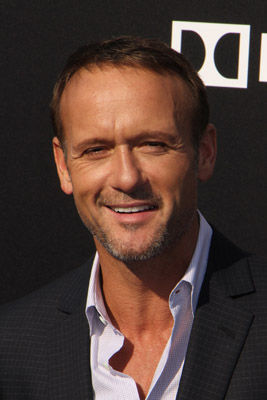
On the morning of press day for The Shack, it started out like any other day until I got into the elevator. Shortly after the elevator doors close I hear someone behind me singing; I turn around and that someone turns out to be Tim McGraw!!! During the way too short elevator ride, the country heartthrob blessed us with elevator music I will never forget.
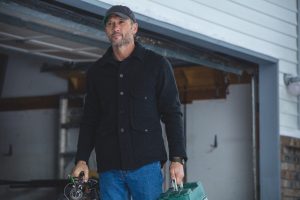 Q: Family oriented roles seem to be a lot closer to what you’re playing these days. Are there parallels to that and your music?
Q: Family oriented roles seem to be a lot closer to what you’re playing these days. Are there parallels to that and your music?
I think I’d go even involving my music. I think I’m always searching for big (and universal) things that you can just reach outside the norm of what you’re doing. I’m very family oriented. I’ve always been family oriented.
I came from a disoriented, dysfunctional family growing up. I think that’s probably instilled in me to need and want to have a strong family and a great foundation. I think that’s something I naturally gravitate towards. (I’m) just looking for a great story that moves and inspires you in a way (where) I want to be impacted viscerally.
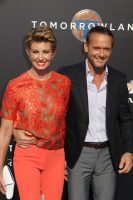 Music and movie scripts are books when you read all that stuff. You want to be literally moved and that’s the sort of things I look for. When I read the script to “The Shack” I had not read the book. My wife (Faith Hill, musician) actually had the book on her nightstand. We’d heard about the book and knew what the books story was. About a week after she put it on her nightstand to start, they were sending me a script to read. I read the script and was completely in an emotional meltdown.
Music and movie scripts are books when you read all that stuff. You want to be literally moved and that’s the sort of things I look for. When I read the script to “The Shack” I had not read the book. My wife (Faith Hill, musician) actually had the book on her nightstand. We’d heard about the book and knew what the books story was. About a week after she put it on her nightstand to start, they were sending me a script to read. I read the script and was completely in an emotional meltdown.
A friend of mine that work for me read the script for me before I did and he fell apart reading the script as well. I told Faith (Tim’s wife) about it and we had a lot of conversations about whether I had time to be involved because it was in Vancouver, and I was working doing concerts and flying at 3:00 AM. I was working all day, flying to do shows. We wanted to see if we could even work, and we just had to. Finally we just had to do it.
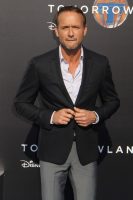 Q: Did you find the role easier or difficult to slip into?
Q: Did you find the role easier or difficult to slip into?
I think certainly there’s a weight on when you go into something like this, and a responsibility that you feel. However, I think for me, what I found was, “Who would I want in my life at this particular time?” There’s no way as an actor or person. You can try but you can’t communicate what happened to this family. You can’t go into in and put something together from your life that can match the tragedy that happened to this family.
You can find parallels to your life where you’ve gotten lost. (There’s) parallels where you’ve gotten off track or you feel like there’s no way you can dig yourself out. There (feels) like there is no help you get out because you’ve been so wrong and so devastated maybe to someone else’s life. You can’t think that you can’t find redemption in any way.
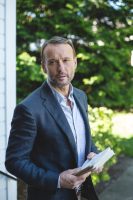 I think for me going into this, I really wanted Willy (Tim McGraw’s character) to be a conduit for Mack (played by Sam Worthington). I wanted him to be somebody he could walk behind, almost like a seeing-eye dog in a lot of ways to help him navigate.
I think for me going into this, I really wanted Willy (Tim McGraw’s character) to be a conduit for Mack (played by Sam Worthington). I wanted him to be somebody he could walk behind, almost like a seeing-eye dog in a lot of ways to help him navigate.
Q: You take on emotional, spiritual and intellectual roles. Does it feel the same way for your music? Do you get the same feelings as an artist?
I do, music has to hit me in a visceral way. It’s different. Sometimes I think as an artist you tend to always tend to go toward the heartbreak and the sadness because those are the deepest and heaviest emotions you can pull out as an entertainer and as a singer, in a lot of ways. And everybody loves a sad ballad because it’s cathartic. For artists, in a lot of ways, that’s sort of our therapy sessions is when you’re singing a song.
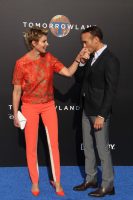 You’re sort of in a lot of ways therapy sessions for a lot of people in sort of a third-dimensional kind of way that you don’t really realize. But, yeah, music has to do that for me. And sometimes it’s big themes, which I’m always looking for big themes in a way to transcend just a love story or just a fun party song.
You’re sort of in a lot of ways therapy sessions for a lot of people in sort of a third-dimensional kind of way that you don’t really realize. But, yeah, music has to do that for me. And sometimes it’s big themes, which I’m always looking for big themes in a way to transcend just a love story or just a fun party song.
You try to find something that will connect people in different ways. I think this film certainly does that. I’ve been lucky a few times, musically, to be able to do that. And when those times happen, I feel like I’ve been fortunate enough to find a piece of material that would work for anyone that wanted to do it, and I got fortunate enough to be able to.
Q: How did you get acting bug?
I was always interested in it. I did a few plays early in my (career). I didn’t do any in high school but I sure remember in elementary school doing “The Music Man” playing “Winthrop Paroo” and (singing), “Oh ho, the Wells Fargo wagon is comin’ down the street…” So that had a real impact on me and I loved doing it but I was an athlete. So all through junior high and high school I was playing basketball, baseball and football. So I was always involved in athletics.
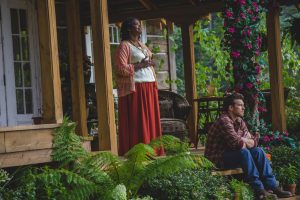
When I sang, I sang in church and I sang at people’s weddings, that sort of thing. That was where I got my start. I wanted to act, but I was in the middle of my music career. When you get in the middle of a career and you’re successful, people come and offer you things. My biggest fear was that if you try to do something else and you’re trying to build your music career, and then you say, “I’m going to go do a movie,” and you’re terrible, you can really hurt your music career because as a musician, the goal is to be cool. That’s the ultimate goal, you want to be cool.
You’re a musician. You’re playing the guitar and you’re in front of all these people and your vibe is to be as cool as you can possibly be. So when it comes to film, you’ve got to drop all that. That can’t be part of the load that you carry into a movie. You can’t say, “I’m going to try to be cool at all cost when I do this,” because that’s the opposite of what you need to do as an actor.
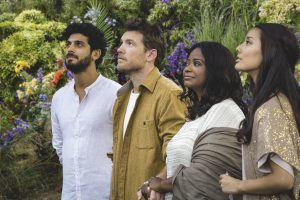 So it took a while for me to reach the point where I felt comfortable enough in my career that I could step into an acting role and not be cool and not ruin my music career. I had no intentions of doing anything and I played (a gig) in Phoenix, Arizona and Rick Schroeder (actor/director) came to the show and was a big fan and he came backstage and he wanted me to be a part of this independent film he was doing called Black Cloud.
So it took a while for me to reach the point where I felt comfortable enough in my career that I could step into an acting role and not be cool and not ruin my music career. I had no intentions of doing anything and I played (a gig) in Phoenix, Arizona and Rick Schroeder (actor/director) came to the show and was a big fan and he came backstage and he wanted me to be a part of this independent film he was doing called Black Cloud.
He wanted me to play the sheriff and I didn’t want to do it and I wasn’t ready to do it. But he was such a nice guy, and he was face to face with me and asking me to do it at my show, and he’s one of the sweetest people you will meet in your life, and I couldn’t say no. I said, “Uh, OK. Alright, I’ll do it.”
Then I showed up and did a great job on this little independent film about a Native American boxer and I really enjoyed the role of playing sheriff and I learned so much. I learned so much, looking back and watching it about what to do and how to do it. It was like a light when off and I said, “OK.” Now seeing it from afar and watching myself do this I think I can understand this a little better.
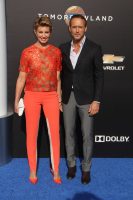 A little time went by, and I had this script Friday Night Lights (2004 movie) that I’d never read. I remember Faith was cooking dinner and the kids were really young and I didn’t really have anything to do that night and the Friday Night Lights script was sitting on the counter so I picked it up and started thumbing through it and I finally got interested in it and sat down and read the whole thing. When I finished it, I grew up in Louisiana, and I grew up with some dysfunctional family, like I said earlier, with some very serious abuse from stepparents, my stepfather, who could be a very beautiful person on one hand and be terrible on the other, so it leaves your soul malice as a child.
A little time went by, and I had this script Friday Night Lights (2004 movie) that I’d never read. I remember Faith was cooking dinner and the kids were really young and I didn’t really have anything to do that night and the Friday Night Lights script was sitting on the counter so I picked it up and started thumbing through it and I finally got interested in it and sat down and read the whole thing. When I finished it, I grew up in Louisiana, and I grew up with some dysfunctional family, like I said earlier, with some very serious abuse from stepparents, my stepfather, who could be a very beautiful person on one hand and be terrible on the other, so it leaves your soul malice as a child.
I read this part I played in Friday Night Lights and I instantly connected to that character and knew that guy and knew, not based on one specific person, but elements of that character from all the world that I lived in, playing baseball and seeing parents drunk and getting in fights with referees and umpires and coming into the dugout and yelling at their kid, all those sorts of things that I saw growing up and being a part of in the sports that I was in and the area of the country that I grew up in, those sort of things just sort of flooded me, and I knew I had to do this. Pete Berg (director) didn’t know me from anybody.
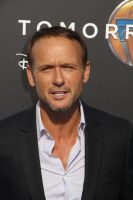 I met him out here and he still didn’t know who I was when I had coffee with him. He wouldn’t let me audition. He said, “I already know who I want this part to be and I’m not going to have some country singer that I don’t know be in my movie.” So I kept calling him and I kept calling him and I kept calling him. Finally, he was in Austin, Texas setting up for the movie and I called him and said, “I’m coming down to your office and I’m going to read for this part.”
I met him out here and he still didn’t know who I was when I had coffee with him. He wouldn’t let me audition. He said, “I already know who I want this part to be and I’m not going to have some country singer that I don’t know be in my movie.” So I kept calling him and I kept calling him and I kept calling him. Finally, he was in Austin, Texas setting up for the movie and I called him and said, “I’m coming down to your office and I’m going to read for this part.”
He was like, “OK.” So I went in and read and left not knowing how I did. Faith and I went to Paris to shoot a video and I got a phone call from Billy Bob Thornton (who was cast as Head Coach Gary Gaines) and he said, “I just talked to Pete Berg.” I knew Billy Bob a little bit, not much. He said, “I talked to Pete Berg and he said he had a country singer come in and audition for him and blew him away. And I think you’re going to get the part.” The next day Pete called and gave me the part.
The Shack is currently playing in theaters nationwide. For ticket information and theatre locations, visit the film’s official website at, http://www.theshack.movie/
Interview by Izumi Hasegawa – @HNW_Izumi
Edited by: Jody Taylor – @RealJodyTaylor
Follow Us: What’s Up Hollywood at @WhatsUpHWood
